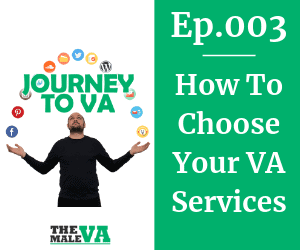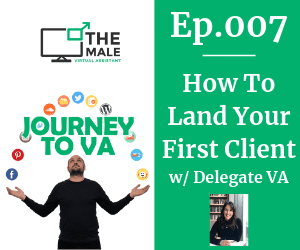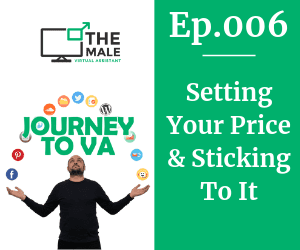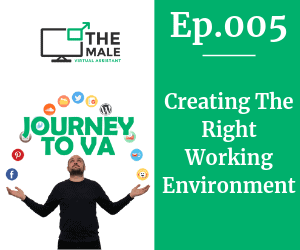 In this episode, I talk about how to choose your VA services, how I resisted the urge to “fake it until you make it”, and why offering potential clients the world isn’t the best approach.
In this episode, I talk about how to choose your VA services, how I resisted the urge to “fake it until you make it”, and why offering potential clients the world isn’t the best approach.
“Being known for one specific set of skills is better than having a reputation as a jack of all trades”
In this episode I cover:
- Identifying what skills you have
- What do you most like doing?
- Which of my skills are transferrable from my career?
- What skills do my target audience/clients have?
- Why I think being a specialist beats being a generalist
- Avoiding the “fake it till you make it” nonsense
How To Choose Your VA Services
Previous Podcast Episode: How To Name Your New Business
[convertkit form=976414]
Previous Episode: How To Name Your Business
Amy Cuddy’s Fake it till you make it TED talk
Transcript
Hello, and welcome to Episode Three of The Journey To VA Podcast. I’m your host, Mark Smith, aka The Male VA. And n this episode, I’m going to be covering how I chose the services I’d offer as a virtual assistant.
So first things first, I started by looking at the skills I already had. And then alongside that, I was also looked at the things I really enjoy doing, which I wasn’t necessarily as good at. So I rather quickly put them into a chart, basically a four-square grid, so two boxes, top two boxes at the bottom. And in the bottom row, where the skills were, I had the least amount of experience. So bottom left box was the least amount of experience and the least enjoyable tasks.
So the X is basically from bottom to top was how much experience I had from left to right, how much I enjoy doing them. So bottom left being low skill level, essentially, and not particularly enjoyable. Bottom-right being not particularly high skill level, but I really enjoy doing them. And then top left is stuff that I’m really good at, but not necessarily enjoy as much. And then top right are things I am really good at. And things I really enjoy.
Now, if you can find a client where all of your skills fit in that box, then that’s the dream job, right. And part of the reason for going as a self-employed business owner is about doing things that you enjoy. So it was very obvious to me that as soon as I started to fill that box with skills that I really enjoy doing and skills I already possessed, it made it obvious that that’s really what I wanted to do for a living.
And so some of the skills that went in that box, things I’m really good at, I really enjoy the web design, SEO, anything really digital, so social media content, things like that, all of that stuff ended up in that box, which I kind of knew beforehand, but it was a useful exercise anyway. And what I also found out is I’m really good at admin, organisation, and stuff like that, I’ve always been really good clearing my inbox, and organising it and stuff like that. So could quite easily do that for someone else. But I would find it potentially quite boring.
So, therefore, I wouldn’t really enjoy it. Although it was really good, it would make a good skill to offer. And I could give someone a really good service doing it. But it became apparent that I probably wouldn’t really enjoy it as much. And as a self-employed business owner, you don’t really want to be doing things that you’re not enjoying, right, the whole point of starting a business and going out on your own is to do the things you enjoy.
Get the life that you feel like you deserve, and make a difference not only to other people, clients and stuff, but to your own life and just doing things you enjoy. So once I’ve done that chart, and if you go to the show notes page on the website, it’s my va.co.uk forward slash three, you’ll be able to download a copy of the chart that I used, obviously a blank one for you to use, there’s actually two jobs there. One is the high school level, or the skill and enjoyment axes. And then another one is skill level and demand for those skills.
So that was step two, really so what’s identified the skills that I really enjoyed doing and felt that I was particularly good at, I then started again, but with a different axes and started to look into what skills were missing, particularly from the VA industry itself, not necessarily missing in the UK, or, you know, the business owners didn’t have access to, but it was the same skills really.
So I plotted those and I felt that not many VAs that I looked into, were offering anything more than basic WordPress management. So a lot of them claim to offer website management. And what that really means is their login, they’ll update your plugins, potentially take a backup of your site. And they’ll schedule your blog post may be. And that’s pretty much as far as it goes. Whereas my skills, quite a bit broader than that, in that I can do the web design. I can, you know, deal with security issues and stuff like that. And actually look, I can go on to servers and stuff like that and actually fix deeper issues than those that are on the surface, where a regular VA offered something like this would potentially need to reach out to a web developer or something to support if anything drastically wrong. Or alternatively, they push back to the client and say, actually, this isn’t what you’re paying me for, you need to find someone else, which is not great for the client either.
So once I’ve been through the exercise twice, and I urge you to do the same, you could just go through your CV, if you’re brand new to this, if you’re just jumping into the world of being a VA, and you could go through your CV or if you already know off the top of your head, the skills that you’ve got, you can start to block those. And what you want to do is really find those that you’re really good at and that you really enjoy doing, and then see where the demand for those skills lies in terms of what the industry is there a big gap in service because not all the VAs target all industries.
Some are very specific in a couple of VA groups on Facebook. And there are some in particular that just focus on lawyers, for instance, or because they’ve got a background in being a legal secretary or something. So you know, again, to find your niche later, but really try and focus in and hone in on the skills that you do have and you do enjoy doing because this is your business, you can decide exactly what you want to do.
So once I did that, there was a number of skills that I wasn’t necessarily, I would say I was bad at them, but I really enjoyed them, but didn’t necessarily have the skills or the experience to back it up. So I’ve taken several courses, in content marketing, social media, marketing, all of that stuff, kind of create in the magnets, and email marketing all of that stuff, because I absolutely love that. But because of the nature of my previous employment, I just wasn’t really a part of my role. So if there are any things that you really, really enjoy, but you’re not as good at, you know, maybe don’t offer them up front, or offer them a reduced rate and just be really open with any potential clients and just say, Look, I’m in the process of learning this, for now you can have this At this rate, what’s I feel like I could offer you the full service and I’ve got a bit more experience under my belt, then my rates will go up, essentially. And I think that’s perfectly okay, as long as you’re honest.
Which brings me on to my next point really, is, there’s a saying, made famous by I think her name’s Amy, someone or other, and it is a TED talk. And she talks about faking it until you make it. And there are two trains of thought for a long time actually believed in what she said in that, fake it until you make it you know, take something calm and figure it out later. And a lot of people still think that and I think that as a VA be quite easily found out if you were to take on a piece of work that you had very little experience, or you will learn on the job, you’d rather be found out through the map time is taken. Because it’s likely This isn’t the first time that someone’s outsourcing this particular piece of work, or you’re just won’t be able to get to the solution.
And that’s, I mean, that’s not good for your reputation is it. So I would urge you not to fake it until you make it. But actually just to be honest, and just say, look, here’s where my skill sets lie, I think I can help you with this. But I’ll charge over reduced rate on this because I don’t have the experience and you are my first paying client. And if you’re doing other work for them, it’s likely that you’ll still get the gig if it’s a brand new client, and that’s all they want. They may look elsewhere, but you don’t really want your reputation to be in tatters early on, or because you taken on something that you can’t handle. I think that would be unfair, only for you and your self-confidence, but also to your client as well.
How would you feel if you outsource your logo or website development, for instance, and they didn’t have a clue what they were doing and ended up, you know, having to outsource it further or extra costs, or they kept all of it for a couple of weeks and just say, Look, I’m not gonna be able to do this, you’d be pretty math, right? If they had just been upfront with you and just said, Look, I’m new to this game. I’ve been practising, I’ve done some training, I just want to get a first, my first couple of paid clients under my belt, I think you probably be a little bit more open to that. And I did the exact same thing when I started out in web design.
In fact, my first websites that I built, were free, I did one or two, and then I did four or five that were just 100 pounds. And that’s something I now charge anywhere between five and 750 pounds for the same sort of service really, admittedly, my design skills have got an awful lot better. But when you’re starting out, people expect a level of service. And it’s difficult to differentiate and really sell yourself, especially when you don’t have like a portfolio or examples behind you.
It’s difficult to set yourself apart from everyone. And so one way to do that is to offer a discounted rate to counteract the inexperienced, essentially. So another thing to think about when you’re coming up with the services you need to offer is to consider who your target audiences. And I’ll do a whole different episode on, you know, identifying your target audience, and that will come up fairly soon. But you want to think if you’re targeting a photographer, for instance, and you just wanted to work with freelance photographers and do their admin for them, they’re likely to be fairly tech-savvy, because they are using the Adobe Suite, for instance, to do their photo editing and another way around a computer. But what they might not be particularly good at is lead generation or marketing. So they might be really Yeah, really design focused, could probably work our way around a website create leaflets and stuff, because they’ve probably got a creative eye.
But marketing potentially could be something that they just don’t know anything about, and how to really sell themselves. So what you want to do is consider what you who your target audience are, and look at where their skills gaps might be. So if you’re working for Are you looking at tradesmen, for instance, most tradesmen, I know are absolutely brilliant at their trade, put some tools in their hands, and they’ll be able to do exactly what you want, but put them in front of a computer or a tablet, or even a smartphone sometimes, and by their own admission, they’re just not particularly tech-savvy.
And that’s where you can really come into your own. Admittedly, these particular clients also need really selling to because they’re so far away from the technology, usually they don’t realise they need it. However, if you can identify not only skills that you’re really good at, but skills that you really enjoy, and have those skills, those that are in most high demand, because your target audience lack them, as long as you can get in front of those people to sell to them, I think you’re onto a winner. Lastly, try not to just be a generalist, every VA, well not every VA, that’s unfair statement, most liaison coming across and there are thousands of them in the UK, are very, very general. And that they all offer bookings and emails and admin and stuff like that do something or choose a particular skill that he was just really set you apart from the others and really own that.
I think it’s better to be a specialist in something and become known for that thing than it is to be a generalist and a kind of jack of all trades. There’s a saying, I’d rather be known as someone that knows a subject inside out. And so that way, when anyone’s ever talking about I don’t know, email marketing, for instance, if someone’s ever talking about you, man mocked him RGA Well, I know a guy who can who knows that inside out, no, I know VA, he knows it inside out, let me pass you on the details, I just someone’s just offer an email marketing is just part of a whole host of different tasks are you more or less likely to be recommended?
In my opinion, I’d say you’d be less likely, if you’re just Yeah, you do a little bit of this and a little bit of that, I think you’re less likely to stand out with someone who’s going to get recommended and as much as you would if you’re a specialist. So try and find a group of skills that you can really specialise in and become known for a really own that and become an authority in that and we’ll get onto content marketing and just how important that is. But if you can pick a subset of skills that you really enjoy, you know, your clients need and you’re really good at and really own that right about that become an authority figure on that.
So that you are the go-to person, either in your area or in the industry that you’ve chosen to try and work with, you can become that person, obviously, the client welcome rolling in. Okay, so don’t forget to head over to the podcast page is the mail va.co.uk forward slash three, that’s the number three. And that will take you to the show notes page. And that will give you the option to download a couple of the charts that I spoke about in the beginning. So when you’re just saying your skills, how into a chart just so you can really identify where they are and be honest with yourself when you’re completing this, you head over to the website, you’ll be able to download those there. Okay, thanks for listening, and I’ll be back soon with another episode of the journey to a podcast.
See you next time.



